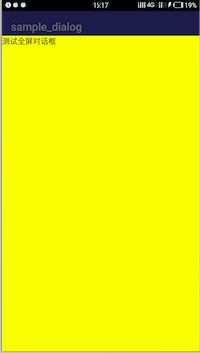Dialog全屏设置
一、Dialog的全屏设置
关于Dialog的全屏设置,网上一大把的方法,但是大多数都不全面或者有一些冗余的设置。这里列出一个最基本的全屏设置方式。
public class FullScreenDialog extends Dialog {
public FullScreenDialog(@NonNull Context context) {
super(context);
}
@Override
protected void onCreate(Bundle savedInstanceState) {
super.onCreate(savedInstanceState);
//设置一个布局
setContentView(R.layout.dialog_test_fullscreen);
//设置window背景,默认的背景会有Padding值,不能全屏。当然不一定要是透明,你可以设置其他背景,替换默认的背景即可。
getWindow().setBackgroundDrawable(new ColorDrawable(Color.TRANSPARENT));
//一定要在setContentView之后调用,否则无效
getWindow().setLayout(ViewGroup.LayoutParams.MATCH_PARENT, ViewGroup.LayoutParams.MATCH_PARENT);
}
}
其中有两点需要说一下
1. setContentView可以在外部调用,不一定要在自定义的Dialog里面。同理,getWindow().setBackgroundDrawable和getWindow().setLayout也可以在外部调用。如下,
Dialog dialog = new Dialog(this);
dialog.setContentView(R.layout.dialog_test_fullscreen);
dialog.show();
dialog.getWindow().setBackgroundDrawable(new ColorDrawable(Color.TRANSPARENT));
dialog.getWindow().setLayout(ViewGroup.LayoutParams.MATCH_PARENT, ViewGroup.LayoutParams.MATCH_PARENT);2. 背景色可以通过指定Dialog的Theme来完成
Dialog dialog = new Dialog(this, R.style.AppTheme_FullScreenDialog);
dialog.setContentView(R.layout.dialog_test_fullscreen);
dialog.show();
dialog.getWindow().setLayout(ViewGroup.LayoutParams.MATCH_PARENT, ViewGroup.LayoutParams.MATCH_PARENT);
二、AppCompatDialog全屏设置
首先,AppCompatDialog是继承于Dialog的,但是加了一些support v7的一些特性和定制。如果我们直接使用上面的方式来设置,会发现达不到全屏效果,对话框的最顶部会出现部分空白。如下:

这个时候,需要额外设置一个属性dialog.supportRequestWindowFeature(Window.FEATURE_NO_TITLE),话说这个属性我找了很久,最后在support design的BottomSheetDialog看到的。如下:
AppCompatDialog dialog = new AppCompatDialog(this, R.style.AppTheme_FullScreenDialog);
dialog.supportRequestWindowFeature(Window.FEATURE_NO_TITLE);
dialog.setContentView(R.layout.dialog_test_fullscreen);
dialog.show();
dialog.getWindow().setLayout(ViewGroup.LayoutParams.MATCH_PARENT, ViewGroup.LayoutParams.MATCH_PARENT);
如果是自定义继承于AppCompatDialog,可以直接在构造方法里设置这个属性,完整示例如下:
public class FullScreenDialog extends AppCompatDialog {
public FullScreenDialog(@NonNull Context context) {
super(context);
supportRequestWindowFeature(Window.FEATURE_NO_TITLE);
}
@Override
protected void onCreate(Bundle savedInstanceState) {
super.onCreate(savedInstanceState);
//设置一个布局
setContentView(R.layout.dialog_test_fullscreen);
//设置window背景,默认的背景会有Padding值,不能全屏。当然不一定要是透明,你可以设置其他背景,替换默认的背景即可。
getWindow().setBackgroundDrawable(new ColorDrawable(Color.TRANSPARENT));
//一定要在setContentView之后调用,否则无效
getWindow().setLayout(ViewGroup.LayoutParams.MATCH_PARENT, ViewGroup.LayoutParams.MATCH_PARENT);
}
}
三、Supportv7 AlertDialog全屏设置
AlertDialog继承于AppCompatDialog,但是不用设置supportRequestWindowFeature,设置全屏的方式,和普通Dialog一样。如下:
AlertDialog dialog =
new AlertDialog.Builder(this).setTitle("Title")
.setMessage("Message")
.setNegativeButton("Cancel", null)
.setPositiveButton("Sure", null)
.create();
dialog.show();
dialog.getWindow().setBackgroundDrawable(new ColorDrawable(Color.YELLOW));
dialog.getWindow().setLayout(ViewGroup.LayoutParams.MATCH_PARENT, ViewGroup.LayoutParams.MATCH_PARENT);
更正:
上面说必须设置一个背景才能全屏,说的是默认背景有padding值,说错了,padding不会影响这个,而是因为默认背景有inset值,如下:
<inset xmlns:android="http://schemas.android.com/apk/res/android"
android:insetLeft="16dp"
android:insetTop="16dp"
android:insetRight="16dp"
android:insetBottom="16dp">
<shape android:shape="rectangle">
<corners android:radius="2dp" />
<solid android:color="@android:color/white" />
shape>
inset>